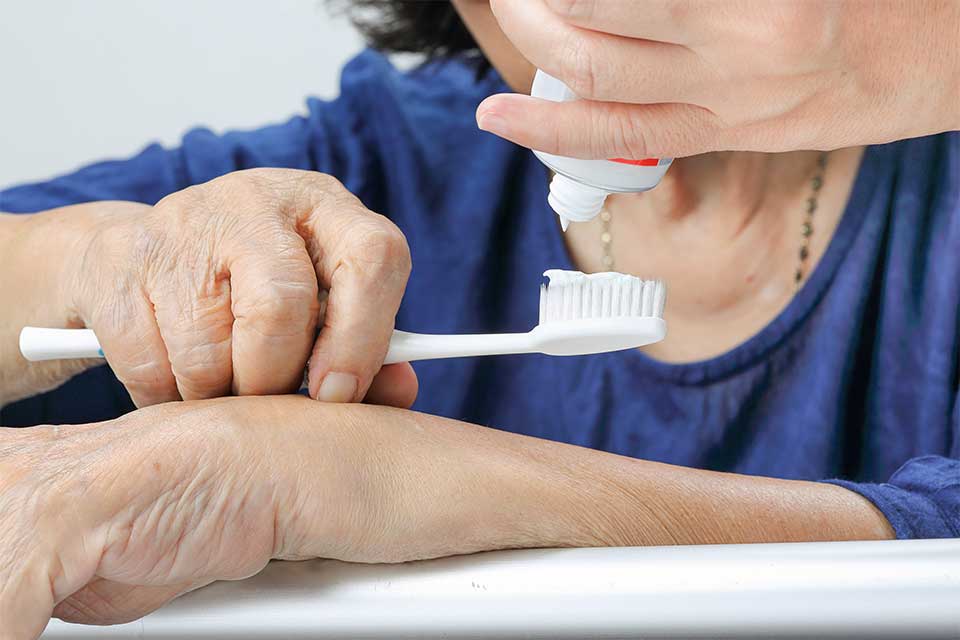
Personal Care for Elderly Adults: 12 Tips From a Professional Caregiver

Personal care for seniors means helping them with activities of daily living (ADLs) like bathing, dressing, brushing teeth, grooming, and helping with continence care if needed. Saige Via is a caregiving supervisor at Chestnut Knoll assisted living community in Boyertown, Pennsylvania. She shares with us her expert advice on personal care for seniors, and how to accomplish essential caregiving tasks while also maintaining the senior’s dignity. For a smoother and safer experience, follow these important steps tips from Via, such as incorporating the person’s existing routine, organizing their bathroom items, and respecting their privacy and comfort level.
Let our care assessment guide you
Our free tool provides options, advice, and next steps based on your unique situation.
Key Takeaways
- Seniors might need help with their personal care as they age. Caregivers can help seniors with personal care activities, like bathing, grooming, and dressing.
- Elderly hygiene issues become serious if neglected. Skin infections are a common health problem in elderly adults, and dental care is also important to avoid health problems.
- Caregivers should respect a senior’s personal care preferences. Loss of independence can be stressful to elderly, so caregivers should respect a senior’s wishes as much as possible.
- Seek help if needed. The senior might prefer a professional caregiver to bathe them over a family caregiver.
1. Address elderly hygiene issues with care
Though difficult for anyone to address, lack of hygiene is one of the most important signs an aging parent needs help with their daily living tasks. However, relying on others’ help with personal care can feel invasive and even humiliating for many seniors. It’s important to have honest discussions about what kind of help your loved one feels comfortable with to relieve stress and create trust, explains Via.
“Providing care to someone is a very personal and private thing,” she says. “Some people may not want to accept help from you. It’s best to have these kinds of conversations ahead of time.”
If you notice your loved one struggling to maintain their daily hygiene tasks, start a conversation with them to learn more about their preferences and abilities. Try asking them the following questions:
- Do you prefer a family member or a nurse or caregiver to help you?
- What activities do you need help with the most?
- Do you prefer someone of the same or opposite sex to help you shower or shave?
- Is there anything about help with hygiene that makes you feel uncomfortable?
2. Incorporate the senior’s routine
If you’re the primary caregiver helping your loved one with their personal care, try to match their routine as much as possible. Following your aging parent’s normal routine will help them feel more comfortable, Via notes. For example, if your parent showers in the morning, try to maintain that schedule for them. If they like to use specific items — such as certain washcloths, soaps, or shampoos — keep their favorite items consistent, too.
“There’s no need to add confusion by changing their routine,” Via says. “Try to stick to their normal schedule. You have to remember that you’re entering their space. It can help you build a better relationship.”
3. Adjust their bathing frequency
Hygiene needs for the elderly may be different than you expect. A full shower or bath twice a week is typically sufficient for an elderly person unless accidents occur, Via explains. Sponge baths (using a sponge or wash cloth) should be utilized between full showers or baths. If someone wears incontinence pads or diapers, frequent sponge baths are especially important to avoid infections.
“When someone is incontinent, I will give a quick wash and dry when changing them to avoid any skin breakdown from occurring,” Via says. “I also wash them with soap and water thoroughly every night before bed and every morning when they get ready for the day.”
4. Respect their privacy and comfort level
Some seniors may feel more comfortable holding towels over their private areas as much as possible during bathing or showering. Although the towels will need to be worked around to fully clean those areas, that bit of partial privacy might make your loved one more comfortable during the entire experience.

Let our care assessment guide you
Our free tool provides options, advice, and next steps based on your unique situation.
5. Organize their bathing items
Preparing and organizing items is one of the simplest ways to help ensure bathing goes smoothly. Have these basic materials ready before you begin:
- Sponges
- Towels
- Washcloths
- Shampoo and conditioner
- Soap or body wash
“It’s important to have everything you need in one spot, so you can focus on the senior,” Via says.
6. Consider bathroom safety accessories
If your elderly parent has poor balance or can’t stand for long periods of time, you may need to make the shower or bathtub more accessible with some small home modifications.
Consider the following modifications to help ensure safer bathing practices:
- Grab bars near toilets and showers
- Nonslip adhesives on the shower floor
- Shower stool or bath bench
- Handheld shower sprayer
7. Remember to clean under skin folds
Bacteria grows under skin folds and can lead to dangerous infections if not addressed. Therefore, it’s important to clean under every fold and wrinkle, including:
- Breasts
- Neck
- Stomach folds
- Genitalia
It’s also important to make sure to rinse away soap completely so your loved one’s skin doesn’t become too dry or agitated. And always dry these areas fully with a towel to avoid fungal infections.

Talk with a Senior Living Advisor
Our advisors help 300,000 families each year find the right senior care for their loved ones.
8. Remember skin care
Skin infections are one of the most common infections in the elderly and a primary reason proper senior hygiene is so important. Skin becomes more sensitive with age and a skin infection can lower the immune system and overall health and comfort of the senior. So it’s important to keep senior skin clean, dry, and moisturized.
Via suggests patting senior skin dry with a towel instead of rubbing after a wash, to avoid aggravating the skin. Apply moisturizer to prevent dryness and cracking. Moisturizing can even be a bit therapeutic for your senior loved one if you gently massage it into their skin.
The American Academy of Dermatology offers these skin tips for the elderly:[01]
- Keep baths and showers to around 10 minutes
- Use warm water instead of hot water
- Use a soft cloth for washing
- Apply moisturizer to damp skin
9. Maintain their oral hygiene
Maintaining dental hygiene as part of personal care for seniors is another important step for long-term health. Seniors need to see their dentist every six months or more often, depending on their medical conditions. Dentures should be checked regularly for proper fit, and gums need to be checked for gum disease or cancer.
Via recommends practicing good oral hygiene in the morning and before bed. She prepares toothbrushes with toothpaste for seniors who can brush their teeth on their own. If someone can’t brush their teeth on their own, Via will either guide their hand with hers or brush for them. Take care during brushing to not hurt your senior loved one’s gums.
The American Dental Association recommends these oral hygiene practices for seniors:[02]
- Use rotating toothbrushes
- Brush with a high-fluoride toothpaste
- Use topical fluoride (daily mouth rinses or fluoride varnish applications)
- Maintain a healthy diet
10. Help seniors remain independent in their daily tasks
Your involvement with hygiene-related tasks depends on your loved one’s needs and abilities. Do your best to help them remain in control, Via recommends.
“I help with shaving, dentures, brushing teeth, and washing faces, and I approach all of these types of care the same way,” she says. “I ask if they need me to get the items ready or physically assist them. Sometimes they just need items laid out. I try to let them do as much as possible to help them feel independent.”
Always try to help your loved one maintain their dignity and decision making power over their personal care whenever possible.
11. Be patient and don’t be afraid to seek professional help
It’s natural to have good and bad days as a caregiver, especially when helping with personal care for seniors. When you’re feeling frustrated, Via suggests putting yourself in your family member’s shoes to understand how they may be feeling.
“It’s a new and sometimes scary experience for seniors,” she says. “Always be patient, understanding, and communicative.”
Via also says you need to know your limits when providing personal care for seniors to avoid caregiver burnout. When you’re caring for a family member, there may be times when you need to ask for help. It’s best to learn your personal limits, as well as your loved one’s limits. Boundaries can help you develop a healthy and functional caregiving dynamic.
FROM THE EXPERT: DEALING WITH OBSTACLES
If your mom won’t shower, take a step back. Maybe someone else can get her to do it, or maybe someone else has an idea to help.
12. Consider senior care if caregiving duties increase
Helping your loved one bathe can feel overwhelming without the right tools and techniques. Remember, you’re not alone in your caregiving journey. If your loved one relies heavily on receiving personal care, it might be a good idea to consider full-time assisted living arrangements.
Senior living communities provide a full range of personal care services for seniors. Caregivers are available to all residents on-site to help with their activities of daily living, like bathing, dressing, grooming, and other needs. Communities also provide a range of living accommodations, scheduled on- and off-site activities, and dining options. The senior living environment is designed so that your loved one can be as comfortable, clean, and safe as possible.
If you’d like to seek help on your caregiving journey, contact one of our Senior Living Advisors. They offer families free advising on their local senior care options, such as assisted living communities and home care. Advisors are trained to help ease the stress of finding local senior care options and will tailor their recommendations to your loved one’s specific needs and budget — all at no cost to your family.
Key Takeaways
American Academy of Dermatology Association. (2021, September). How to care for your skin in your 60s and 70s.
American Dental Association. (2023, August). Aging and dental health.
Senior living options in all states
The information contained on this page is for informational purposes only and is not intended to constitute medical, legal or financial advice or create a professional relationship between A Place for Mom and the reader. Always seek the advice of your health care provider, attorney or financial advisor with respect to any particular matter, and do not act or refrain from acting on the basis of anything you have read on this site. Links to third-party websites are only for the convenience of the reader; A Place for Mom does not endorse the contents of the third-party sites.
Make the best senior care decision
Make the best senior care decision